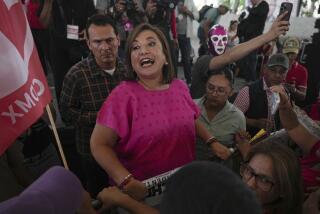A Volatile Mix of Anger and Apathy : Russia: Disillusionment and a growing readiness to endorse authoritarian remedies put newfound democracy at risk.
- Share via
As speculation begins to mount in the West about the outcome of the parliamentary elections in Russia this December and the presidential election next June, the more fundamental questions concern who counts the votes for the deputies to the State Duma and whether the presidential election will take place at all.
It is now clear to serious observers of the Russian political scene that the authorities cheated in the December, 1993, election to the Duma in order to manufacture a turnout of more than 50%. This was required to confer a tenuous legitimacy on Boris Yeltsin’s hurriedly drafted constitution, which shifted power decisively from the legislature to the executive. With a greater computerization of the counting planned for the upcoming parliamentary elections and the threat to the unpopular “party of power” greater than ever before in the post-Soviet period, there are many within the presidential entourage who are desperately afraid of losing power.
Loss of power, they believe, would mean not only loss of office but of liberty. Corruption is on such a wide scale that if action were to be taken against the perpetrators by a new governing coalition, the law courts would be kept even busier trying politicians and businessmen than the Italian courts have been in recent years.
So serious a problem does this present for the development of a still fragile and limited democracy that a leading Russian academic lawyer, in a conversation I had in Moscow last week, insisted that the only way of ensuring fair elections this December would be for the opposition to announce in advance that there would be no legal action taken against politicians currently enjoying the fruits of office.
That, however, is unlikely to happen. Although there is widespread political apathy in Russia today, it is accompanied by anger about the extent of corruption. There are more losers than winners in the emerging market economy and opinion polls now show a majority of Russians preferring a centralized economic system to a market economy. In reality, there is no chance of a return to the world of five-year plans; a form of market economy is likely to continue to evolve. The backlash, however, against politicians deemed to have enriched themselves at the people’s expense means that an anti-corruption policy is too valuable a plank in the opposition program for it to be readily eschewed.
Thus, a politician such as Gen. Alexander I. Lebed, whose popularity is increasing by leaps and bounds, owes some of his growing support to the popular belief that he will restore “order” not only in the sense of curbing crime on the streets but also in combatting bribery and other forms of economic corruption.
Within that part of the political class enjoying the enhanced perquisites of office, there is a real fear of a Lebed coming to power. Yet the most reliable Russian opinion surveys suggest that a combination of nationalist and communist political groupings are likely to poll far better than either the electoral bloc formed to support the existing power-holders--Prime Minister Viktor S. Chernomyrdin’s “Our Home is Russia”--or the democratic parties now in opposition to the Yeltsin administration.
The December elections may be less important in themselves than as an encouragement to some and a warning to others of the likely outcome of the presidential election to be held half a year later. Not only communists and nationalists but some Russian democrats have, accordingly, voiced concern that the presidential appointees on the electoral commission are likely to give a higher priority to getting the right result than to securing an honest one.
If the official result of the December election bodes ill for Yeltsin, or any other presidential candidate representing the interests of Russia’s current power holders, the Russian President will come under great pressure from within his own entourage to find an excuse for postponing the more important June, 1996, elections. Were he to do so, that would be a severe setback to the democratization process in Russia, already under threat from a combination of popular disillusionment with the political process and a growing readiness both within and outside the political class to endorse authoritarian remedies for complex problems.
It would also be a test for the leaders of Western democracies, who too readily offered unconditional approval of Yeltsin’s forcible dissolution of the previous Russian legislature and subordination of the executive and the judiciary to the executive. To praise Russian leaders for their commitment to democracy in the belief that they represent stability may actually undermine both democracy and stability. Democratic institutions and procedures need even more nurturing in the Russian context than the emerging markets. Ultimately, there is no economically viable alternative to the latter, but authoritarian regimes can come in many forms and guises.
More to Read
Sign up for Essential California
The most important California stories and recommendations in your inbox every morning.
You may occasionally receive promotional content from the Los Angeles Times.










